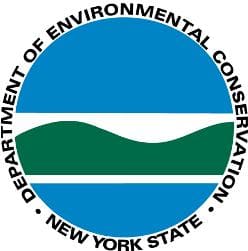New York DEC, Cornell and Local Stakeholders to Work Together on Improving Cayuga Lake Water Quality
OutdoorHub 10.19.12

Draft Cooling Discharge Permit for Cornell University Available for Public Comment
Draft Permit Includes TMDL and $2.1 Million Study of Cayuga Lake by Cornell
Under the terms of a draft permit, Cornell University will undertake a $2.1 million study to fully identify the sources and impacts of nutrient phosphorus to support the development of a total maximum daily load or TMDL, the New York State Department of Environmental Conservation announced today. DEC is accepting comments on the draft State Pollutant Discharge Elimination System (SPDES) permit to address water releases from Cornell University’s Lake Source Cooling facility.
“Under the terms of the draft permit, Cornell will work to limit the amount of phosphorus it discharges in Cayuga Lake and identify all phosphorus sources so water quality can be improved,” DEC Commissioner Joe Martens said. “In addition, DEC, Cornell, and lake stakeholders will cooperatively update the Cayuga Lake Watershed Plan to enhance the ecological health of the lake and its watershed.”
The NYS Water Resources Institute at Cornell will work with local and regional stakeholders in developing sound science and community-based action agendas using the best tools and practices for protecting Cayuga Lake to be included in the updated plan.
Susan Riha, director of the Water Resources Institute, said, “This collaborative effort is something we in the Cayuga Lake watershed have all wanted for a long time. With the support of DEC, Cornell faculty, staff and students have been engaged in research to help implement watershed protection action agendas in the Hudson and, more recently, in the Mohawk River basins.”
These efforts will be supported by the Department of State’s $29,700 Environmental Protection Fund Local Waterfront Revitalization Program grant to the Town of Ithaca, on behalf of the Cayuga Lake Watershed Intermunicipal Organization. The grant will be used to update the Cayuga Lake Watershed Restoration and Protection Plan to address emerging threats to water resources and establish consensus on a new set of actions to advance evolving priorities.
The draft cooling discharge permit limits the amount of phosphorus discharges from the Lake Source Cooling facility for an interim period while the first-of-its-kind analysis of the lake’s water quality is undertaken. A more complete understanding of water quality dynamics within the southern portion of the lake is necessary to develop measures to fully address lake concerns. Public comments are being accepted on the draft SPDES permit until Friday, Nov. 16.
Cornell will conduct a lake-wide water quality study to gather data that will help DEC determine what level of phosphorus can be discharged into the lake without causing water quality impairments. There are multiple sources of phosphorus pollution in the Cayuga Lake watershed, such as municipal wastewater discharges and urban/storm water runoff. Increasing development, stream erosion, road bank erosion and agricultural activity are also potential sources of phosphorus to the lake and its tributaries and will be considered.
The south end of Cayuga Lake has been identified as an impaired water body due, in part, to high levels of phosphorus. Cornell’s Lake Source Cooling facility draws water from Cayuga Lake and uses it to cool campus buildings and then discharges into the lake. Because the water withdrawn from the lake contains phosphorus, the discharge from the cooling also contains phosphorus. Phosphorus in water has been linked to reductions in oxygen necessary for fish to breathe and an increase in algae that turn waterbodies green.
DEC will use the study results to prepare a TMDL. This plan will take a comprehensive look at all sources of phosphorus and help address longstanding impairment to the lake. Based on the TMDL, phosphorus reductions will be allocated to the dischargers, including Cornell.
The draft permit is available for review on DEC’s website at: http://www.dec.ny.gov/enb/enb.html. Public comments on the draft SPDES permit must be submitted in writing no later than Friday, Nov. 16. Comments can be mailed to the address below or emailed to: depprmt@gw.dec.state.ny.us.

